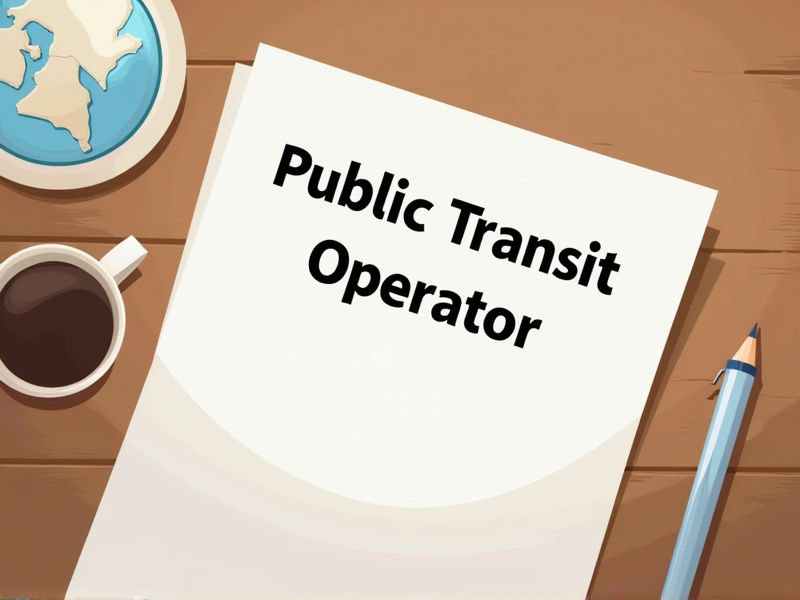
Public transit operators are responsible for the safe and efficient transportation of passengers, necessitating a high level of skill and knowledge. Certifications ensure operators are well-versed in traffic laws, emergency procedures, and vehicle maintenance. These requirements also help in minimizing risks and maintaining public trust in transit systems. Here are some important certifications required for a public transit operator.
Commercial Driver's License (CDL) with Passenger Endorsement
A Commercial Driver's License (CDL) with a passenger endorsement is essential for operating large vehicles carrying passengers, ensuring that operators have the specific skills and knowledge to handle such responsibilities safely. Public transit operators must navigate complex urban environments, and this specialized license confirms their ability to manage larger passenger vehicles under varying traffic conditions. Regulatory requirements mandate this endorsement to align drivers' expertise with safety standards and provide reassurance to passengers relying on public transportation. Acquiring the endorsement involves passing additional tests which verify proficiency in safely embarking, disembarking, and transporting a high number of passengers.
Urban Transit Operator Certification
Urban Transit Operator Certification is required to ensure that public transit operators possess the necessary skills and knowledge to safely navigate complex transportation networks. This certification helps maintain high safety standards, reducing accidents and enhancing passenger security. It also serves as a benchmark for consistent service quality across varied transit systems. Public trust in reliable and efficient transit services often increases when operators are certified, thus potentially boosting ridership.
Defensive Driving Certification
Defensive driving certification equips public transit operators with skills to anticipate potential road hazards. This proactive training reduces accident rates and ensures passenger safety. Insurance premiums for transit companies can decrease due to demonstrated commitment to safety. Legal liabilities decrease as operators adopt best practices for navigating diverse traffic conditions.
Passenger Safety Training Certification
Passenger Safety Training Certification is essential for public transit operators because it equips them with the skills to handle emergencies and reduce accident-related injuries. Proper training can lead to fewer liability claims, as operators are better prepared to prevent and respond to incidents. Certification can also boost public confidence, leading to increased ridership as passengers feel safer. Regulatory compliance often mandates such certifications, ensuring operators adhere to safety standards and avoid potential legal penalties.
Hazardous Materials (HazMat) Endorsement
Public transit operators handling certain routes may encounter situations where they need to transport hazardous materials. Acquiring a HazMat endorsement ensures they understand how to safely handle and respond to potential chemical spills or emergencies. This knowledge reduces the risk of accidents and enhances public safety. Regulatory compliance also mandates operators carrying these materials to have the necessary endorsements, emphasizing the importance of standardized safety protocols.
Emergency Response Certification
Emergency Response Certification equips public transit operators with essential skills to handle critical situations, such as accidents or medical emergencies, thereby reducing risks to passengers. Inadequate response during emergencies can lead to increased casualties and public safety concerns, affecting the transit system's reliability and image. Transit operators with certification can enhance collaboration with emergency services, ensuring streamlined communication and effective resource allocation. Proper training also instills confidence and preparedness in operators, promoting a safer and more controlled transit environment for both employees and passengers.
First Aid and CPR Certification
Public transit operators frequently encounter diverse groups of people, increasing the likelihood of medical emergencies during transit. Having First Aid and CPR certification ensures they can provide immediate, potentially life-saving assistance in such situations. This certification enhances passenger safety and contributes to public confidence in using transit services. Moreover, trained operators can effectively stabilize situations until professional medical help arrives, minimizing risks associated with delayed emergency response times.
Vehicle Operations and Safety Certification
Vehicle Operations and Safety Certification is needed for public transit operators to ensure they possess the skills and knowledge to navigate vehicles safely, minimizing accident risks in diverse traffic conditions. It provides assurance that operators are familiar with emergency protocols, ensuring passenger safety during unforeseen events. Certification helps maintain compliance with regulatory standards, avoiding legal liabilities and potential fines for the transit agency. Public trust in the safety and reliability of the transit system is bolstered, fostering increased ridership and community reliance on public transportation services.
Transit Security Awareness Certification
Transit Security Awareness Certification equips public transit operators with the necessary skills to identify and respond to potential security threats, ensuring passenger safety. Regulatory bodies often mandate these certifications to maintain a standardized level of security across transit systems. Certified operators are better able to recognize suspicious activities, contributing to the prevention of safety incidents. The certification process also fosters a culture of vigilance and preparedness, reducing the likelihood of security breaches.
Customer Service in Transportation Certification
Customer Service in Transportation Certification ensures that public transit operators possess essential communication and problem-solving skills, directly impacting passenger satisfaction. Effective handling of customer issues can lead to increased ridership and public trust in the transit system. Training in customer service prepares operators to manage diverse passenger needs, enhancing overall safety and reducing potential conflicts. Certification supports standardization of service quality across the transportation sector, aligning operators with best practices.
Summary
By using public transit operated by certified professionals, you will likely experience improved safety and reliability. The certifications ensure that operators meet specific standards, leading to a smoother and more efficient transit service. This can result in decreased travel delays and increased passenger satisfaction. Moreover, certified operators are often better equipped to handle emergencies and maintain compliance with regulatory requirements.
